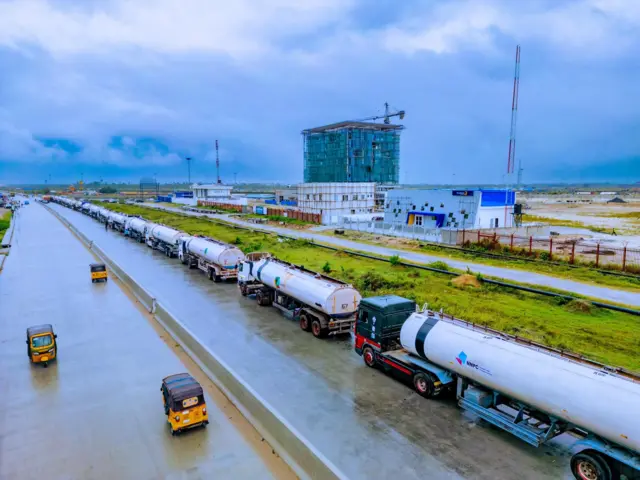The Chief Executive Officer of the Nigerian Midstream and Downstream Petroleum Regulatory Authority (NMDPRA), Farouk Ahmed, has revealed that the 650,000-barrel-per-day Dangote Refinery is already transforming Nigeria’s fuel supply chain, contributing an average of 20 million litres of petrol daily to the domestic market.
Ahmed made the disclosure on Thursday in Lagos during the Annual Conference of the Association of Energy Correspondents of Nigeria, where he highlighted the NMDPRA’s ongoing efforts to boost energy security, attract investment, and stabilise petroleum distribution across the country.
According to him, the commencement of operations at the Dangote Refinery marks a turning point in Nigeria’s quest for energy independence and local refining sufficiency. “Without a shadow of doubt, the operation of the 650,000-barrel-per-day Dangote Refinery has changed the supply dynamics with an average daily contribution of up to 20 million litres, with potential for further ramp-up,” Ahmed said.
He noted that Nigeria’s fuel demand currently stands at about 50 million litres per day, adding that the refinery’s growing production capacity would soon ensure complete local sufficiency and reduce reliance on imported petroleum products.
Between June and September, the Dangote Refinery reportedly exported over one billion litres of petrol to the United States and other countries, further underscoring its rising global relevance.
Represented at the event by the NMDPRA spokesperson, George Ene-Ita, Ahmed said the refinery’s operation signifies Nigeria’s evolving refining landscape and demonstrates the country’s capacity to sustain its energy needs through domestic production.
He emphasised that no discussion about Nigeria’s energy future would be complete without addressing challenges in infrastructure, storage, and distribution. To tackle these issues, he said, the Authority is implementing deliberate measures to strengthen existing systems and protect the nation from external shocks.
“To further secure our energy future, we must operationalise the National Strategic Petroleum Products Stock in line with the Petroleum Industry Act 2021. This will provide a buffer against major supply disruptions,” Ahmed stated.
The NMDPRA chief explained that the initiative would act as a safeguard during supply crises, while also improving transparency and coordination among key stakeholders. He added that Nigeria’s refining future depends not only on private sector strength but also on the establishment of robust national storage and logistics systems to ensure sustainable distribution.
“We are accelerating licensing for storage and depot operations, tightening standards, and intensifying surveillance of product movement to curb adulteration, hoarding, and road accidents involving fuel trucks,” he said.
Ahmed reaffirmed that the NMDPRA remains committed to enforcing transparent and investment-friendly regulations under the Petroleum Industry Act. “Under the PIA 2021, our mandate is to provide technical, commercial, and safety oversight across the midstream and downstream sectors. We aim to be an enabler of growth, not a constraint,” he said.
Read also:
- Breaking the African Middlemen Web for Industrialization: The Dangote Refinery Experience
- Oshiomhole slams PENGASSAN over shutdown of NNPC, Oil Regulators in Dangote Refinery dispute
- Thousands protest in Kaduna over threat to Dangote Refinery
He noted that the Authority has adopted an open regulatory process, publishing rulemaking calendars and consulting stakeholders early to enhance predictability and rebuild investor confidence. Collaboration with operators, labour unions, and the media, he said, remains central to ensuring that reforms deliver tangible results for Nigerians.
“The Dangote Refinery stands as a symbol of Nigeria’s industrial resurgence and a critical driver of fuel sufficiency, job creation, and foreign exchange savings,” Ahmed said. He added that the Authority’s broader energy strategy includes promoting gas utilisation, expanding investment in liquefied petroleum gas (LPG) and compressed natural gas (CNG), and ensuring that energy reforms impact citizens directly.
He called for diversification of Nigeria’s energy investments beyond fossil fuels, saying that such a shift would stimulate sustained economic growth, create jobs, and widen the country’s revenue base.
“With consistent reforms and cooperation, Nigeria can evolve into Africa’s leading energy hub, powered by strong refining capacity, strategic storage, and sound regulation,” Ahmed said. “If we get this right, Nigeria will not just export fossil fuel but design Africa’s energy future.”
In a message to journalists, Ahmed urged the media to spotlight both the challenges and the progress within the energy sector. “When you tell Nigeria’s energy story, don’t just report shortages. Show the pipelines being built, the gas cylinders being filled, and the refinery systems coming to life,” he said.
He concluded that every regulatory action of the Authority will continue to be measured by its real impact on the lives of Nigerians. “Our success will not be judged by paperwork, but by whether citizens feel the difference in their daily lives,” Ahmed affirmed.






